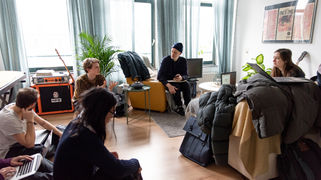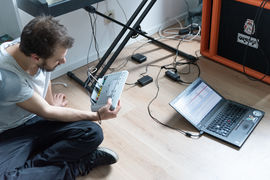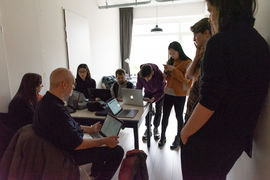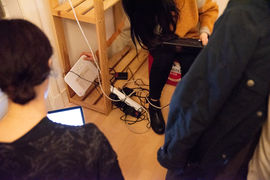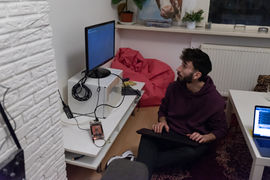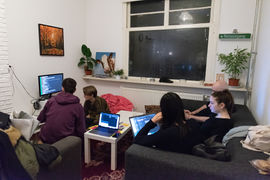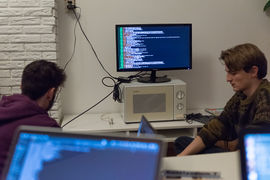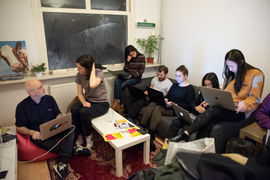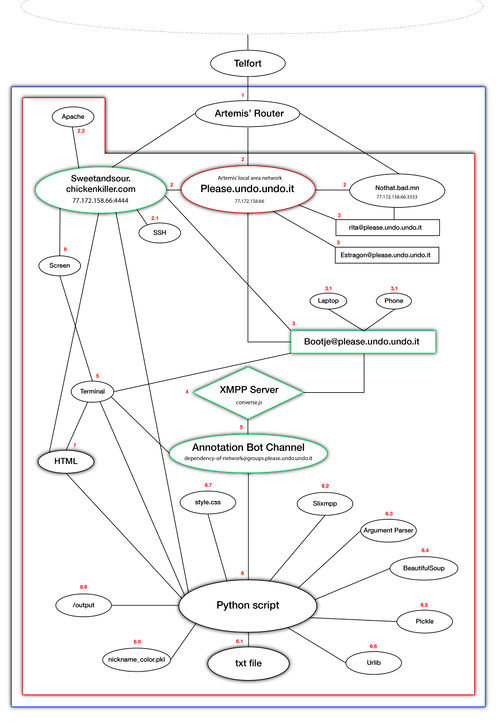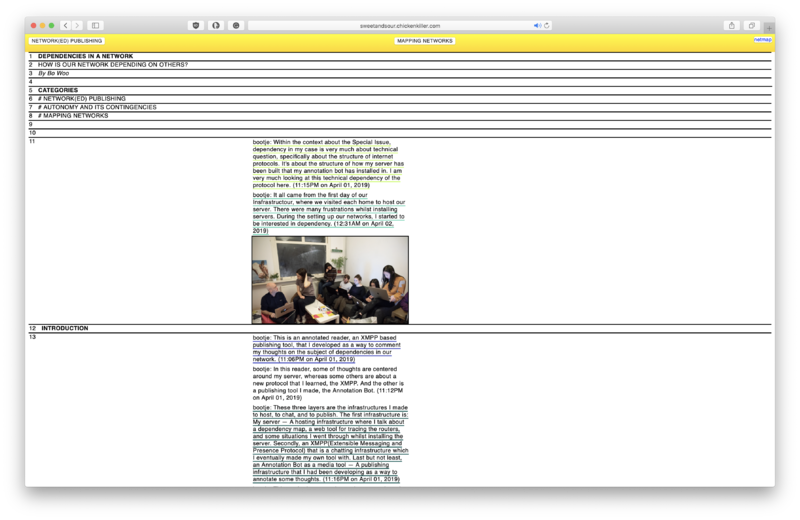User:Bohye Woo/Special Issue 8
Special Issue #08 — The Network we (de)Served
In my project, There are three infrastructures I made to host, to chat, and to publish.
My server — A hosting infrastructure where I talk about a dependency map, a web tool for tracing the routers, and some situations I went through whilst installing the server.
An XMPP(Extensible Messaging and Presence Protocol) that is a chatting infrastructure which I eventually made my own tool with.
An Annotation Bot as a media tool — A publishing infrastructure that I had been developing as a way to annotate some thoughts.
Introduction
From the very beginning of the special issue #8, we started to have the Infrastructour where we visited each other's place to install our own server. I remember I was quite confused on what Roel and Manetta meant by installing the server, and how does the procedure of installation will be going on. I have to admit that I was quite knowledgeless on network as a subject of this special issue #8, except some of my shallow knowledges on how to connect with WIFI on the electronic devices or how to reboot the router that seems to create a WIFI.
With running about a bit of confusions, we had to choose a device for our own server in the meantime. There were six RaspberryPis, a very old mini laptop and a device that looked like a gameboy I had back then around 16-year-old. I was doubting a lot in my head on deciding a device. Although all the devices seemed to be working equally, somehow I was very serious on the selection of the device that is going to be used for installing my server. Ridiculously enough, my laptop was broken at that moment, and I was waiting for my new laptop to be arrived from Korea. Since we needed to have a screen to set up some configurations with the device immediately, I had no choice but to choose the old mini laptop that has a screen, so that I don't need an extra screen to set up some configurations. Moreover this means that whenever I want to check my device, I could check the server in a convenient way because it has a self-contained screen included so logging into the server from another device that has a screen is not needed. It was like killing two birds with one stone.
Having a decent device, it was still hard to install the server. The problem was that my apartment has a central network system where they control all routers connected with the central system. Eventually I couldn't access to the router in order to open my server. This centralized network system on top of my router blocked me from installing the server. At that moment, I was very disappointed that I won't be able to install in a proper way. Luckily, I settled down on Artemis' router which shares different devices including hers, mine and Rita's.
At this point, I questioned myself on what does dependency mean in our network. Having planned to host the server that is independent on the web, it's not anymore an independent server when sharing the router is happened. To me, owning your personal server means that you possess full control of the server. However I could already see some physical and social dependency problems in many ways. Some of dependency issues occured not only from the accessibility of the router, but also from getting permission to use someone else's router. If Artemis doesn't allow me to come over her place to check my device, then I can't do anything with the device. Moreover, if Artemis ever going to move her house and change the Internet service provider, technically my server will gone, likewise, if she ever unplug her router too.
I've been questioning and thinking about the following: Why Couldn't I have my server hosted in my house? What does dependency mean in network? How much are we dependent on network? On who are we depending within our network? There are different layers on dependencies in network, how do you define that you're reliant or not in something/someone? With the Special Issue #8, I experienced self-hosted network, documented on some dependency issues, recorded my observations in my personal level with the annotated publishing tool that also has some dependency stories to tell.
Building up research question
How can we show outsiders to show that the alternatives are valuable than the mainstream? (ex. Facebook or Mastodon - network effect.) What contents this alternative will provide that will radically make everyone feel different? (anciety) (Geert Lovink's text.)
Is there a critical point of the amount of nodes(users) that network has gathered to determine if it’s mainstream network? This critical point is defined by what? Would it be a market percentage? Or by public's preference? Whati is the consequences? in terms of economy etc..
Do the alternative federated networks want to preserve itself always as an alternative to mainstream, or do they aim to overthrow the mainstream overall? what are the assumption? Can alternative have this ambition? Should alternative have this ambition?
Sustainability and finalicality of the platform: Should the alternative establishes a code of conduct (set rules) to control of its own behaviour to distinguish itself from the mainstream? (Ex. Facebook is gathering the information to sell data, pitching it advertisement… ) If you don’t do this mainstream, how can alternatives sustain themselves?
Infrastructour
DOCUMENTATION: Infrastructour
MY SERVER:http://sweetandsour.chickenkiller.com (77.172.158.66:4444)
SERVER — A HOSTING INFRASTRUCTURE
XMPP — A CHATTING INFRASTRUCTURE
ANNOTATION BOT — A PUBLISHING INFRASTRUCTURE
FROM A FEMINIST SERVER (https://pad.constantvzw.org/p/feministserver)
<gallery mode="packed"> File:Annotation-Bot-by-Bohye-Woo-2.png File:Annotation-Bot-by-Bohye-Woo-3.png File:Annotation-Bot-by-Bohye-Woo-4.png File:Annotation-Bot-by-Bohye-Woo-5.png File:Annotation-Bot-by-Bohye-Woo-6.png File:Annotation-Bot-by-Bohye-Woo-7.png File:Annotation-Bot-by-Bohye-Woo-8.png File:Annotation-Bot-by-Bohye-Woo-9.png File:Annotation-Bot-by-Bohye-Woo-10.png File:Annotation-Bot-by-Bohye-Woo-11.png
</galery>

